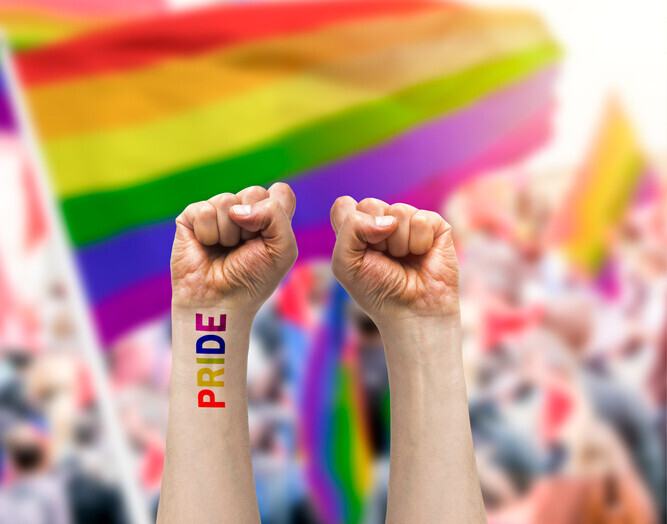hankyoreh
Links to other country sites 다른 나라 사이트 링크
4 in every 10 young LGBTQ S. Koreans have considered suicide in past year, study finds

Almost half of young LGBTQ people in South Korea have seriously considered or attempted suicide in the past year, a study has found. The social discrimination they face is considered the primary factor contributing to their suicidality.
According to a report titled “A Survey of the Social Desires and Actual Life Conditions of Young Gender and Sexual Minorities,” released by the South Korean LGBTQ human rights group Dawoom on May 17, 41.5% of survey respondents said they considered suicide in the past year. Of respondents, 8.2% said they had attempted suicide.
Between August and September of last year, Dawoom surveyed 3,911 LGBTQ people between the ages of 19 and 34 who have resided in South Korea for the past 10 years, publishing the findings in a report last week.
The percentage of those dealing with suicidality among young LGBTQ people in South Korea is markedly higher than the figure among young people in the country in general. According to a report called “A Survey of the Living Conditions and Welfare Needs of Youths,” which the Korea Institute for Health and Social Affairs published in 2020 after surveying 3,018 Koreans between 19 and 34 years of age, only 2.74% of respondents had said they “seriously considered suicide in the past.”
This discrepancy seems at least in part due to the discrimination LGBTQ people face. According to Dawoom’s survey, 3 out of 10 respondents (33.6%) said they experienced discrimination in the past year due to their sexual orientation or gender identity.
Especially of note, 66.9% of transgender respondents said they experienced discrimination, showing just how severely transgender people are discriminated against in South Korea. Young trans people also attempted suicide at a higher rate than young LGBTQ people in general: 20.2% and 12.9% of transgender women and men, respectively, said they attempted suicide in the past year, the figures much higher than that for the young LGBTQ population as a whole.
Meanwhile, young LGBTQ South Koreans rarely reported the discrimination they experienced to relevant agencies. When asked how they dealt with discrimination, only 4.0% of respondents said they reported it to the police. When asked why they didn’t report being discriminated against, 53.0% of respondents said “because nothing would change,” while another 53.0% said “because it didn’t feel worth reporting, as it happens all the time.”
Chingusai, a South Korean gay rights activist group, also found in its 2014 study titled “A Survey of the Social Desires of South Korea’s LGBTI Community” that only 4.4% of respondents reported the discrimination they experienced to relevant agencies. This figure and Dawoom’s survey result indicate that young LGBTQ people’s confidence in agencies tasked to rectify discrimination against sexual minorities has remained at a standstill in the past eight years.
When asked what policies they believed were needed most for LGBTQ people in Korea, 60.3% of Dawoom’s survey respondents pointed to “the legislation of a comprehensive anti-discrimination and equality act” — the most popular policy among respondents. “The legal recognition of same-sex marriages” (42.5%), “the legal recognition of same-sex partnerships other than marriages” (38.0%), and “the cultivation of a media environment where gender equality and diversity are respected” (27.8%) were other causes popular among respondents.
Dawoom stated, “The government is still exhibiting a lukewarm attitude towards conducting studies and developing policies for LGBTQ people.” The group urged the South Korean government to “include [questions about] gender identity and sexual orientation in studies representing the nation.”
In March, the National Human Rights Commission of Korea had recommended that the prime minister and central administrative agencies conduct studies into the state of affairs of the LGBTQ population in South Korea and establish new survey items concerning LGBTQ individuals in national statistical studies.
By Park Go-eun, staff reporter
Please direct questions or comments to [english@hani.co.kr]

Editorial・opinion
![[Column] Park Geun-hye déjà vu in Yoon Suk-yeol [Column] Park Geun-hye déjà vu in Yoon Suk-yeol](https://flexible.img.hani.co.kr/flexible/normal/500/300/imgdb/original/2024/0424/651713945113788.jpg) [Column] Park Geun-hye déjà vu in Yoon Suk-yeol
[Column] Park Geun-hye déjà vu in Yoon Suk-yeol![[Editorial] New weight of N. Korea’s nuclear threats makes dialogue all the more urgent [Editorial] New weight of N. Korea’s nuclear threats makes dialogue all the more urgent](https://flexible.img.hani.co.kr/flexible/normal/500/300/imgdb/original/2024/0424/7317139454662664.jpg) [Editorial] New weight of N. Korea’s nuclear threats makes dialogue all the more urgent
[Editorial] New weight of N. Korea’s nuclear threats makes dialogue all the more urgent- [Guest essay] The real reason Korea’s new right wants to dub Rhee a founding father
- [Column] ‘Choson’: Is it time we start referring to N. Korea in its own terms?
- [Editorial] Japan’s rewriting of history with Korea has gone too far
- [Column] The president’s questionable capacity for dialogue
- [Column] Are chaebol firms just pizza pies for families to divvy up as they please?
- [Column] Has Korea, too, crossed the Rubicon on China?
- [Correspondent’s column] In Japan’s alliance with US, echoes of its past alliances with UK
- [Editorial] Does Yoon think the Korean public is wrong?
Most viewed articles
- 1‘We must say no’: Seoul defense chief on Korean, USFK involvement in hypothetical Taiwan crisis
- 2Will NewJeans end up collateral damage in internal feud at K-pop juggernaut Hybe?
- 3[Column] Park Geun-hye déjà vu in Yoon Suk-yeol
- 4Why Korea shouldn’t welcome Japan’s newly beefed up defense cooperation with US
- 5Thursday to mark start of resignations by senior doctors amid standoff with government
- 6N. Korean hackers breached 10 defense contractors in South for months, police say
- 7[Guest essay] The real reason Korea’s new right wants to dub Rhee a founding father
- 8[Column] ‘Choson’: Is it time we start referring to N. Korea in its own terms?
- 9Kim Jong-un expressed ‘satisfaction’ with nuclear counterstrike drill directed at South
- 10[Editorial] New weight of N. Korea’s nuclear threats makes dialogue all the more urgent